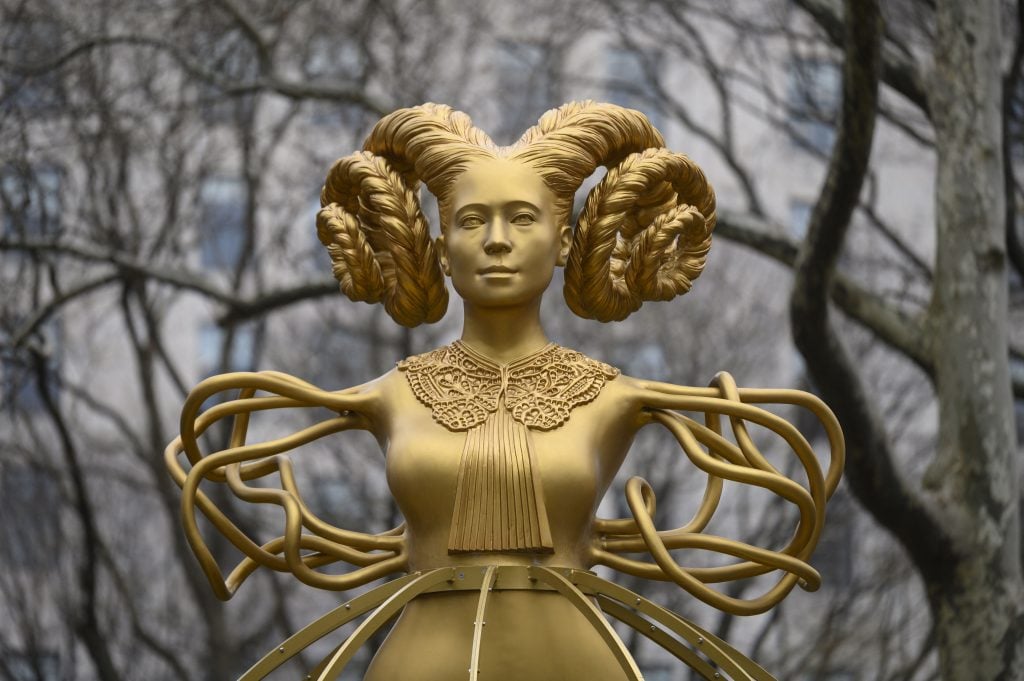Law & Politics
Texas University Comes Under Fire After Cancelling Shahzia Sikander’s Artist Talk
Anti-choice groups claimed the artist's sculpture displayed satanic imagery.

Anti-choice groups claimed the artist's sculpture displayed satanic imagery.

Adam Schrader &
Margaret Carrigan

A sculpture by the Pakistani artist Shahzia Sikander has incurred the wrath of an anti-abortion group in Texas, leading the University of Houston to cancel a planned artist talk and opening reception for her public art exhibition. The university had said that the February 28 event was cancelled because of the “unavailability of the artist.”
Sikander has now pushed back, refuting that claim and saying the cancellation of the talk amounts to censorship.
“I did not ask for the opening event and artist talk at the University of Houston, scheduled for February 28, to be cancelled or postponed,” Sikander said in a statement. “After calls were made for campus protests, the university announced publicly that the artist talk/opening event was cancelled.”
Sikander revealed that there were internal discussions that the events might be replaced by a virtual presentation or postponed, but not cancelled, and that nothing was confirmed. She said she has “proactively offered dates to reschedule.”
The 18-foot-tall bronze sculpture that incited the ire of the group Texas Right to Life is titled Witness (2023) and features a female figure with braids. The work is part of Sikander’s 2023 project, Havah… to breathe, air, life, co-commissioned by the Madison Square Park Conservancy and Public Art of the University of Houston System. Comprised of three works addressing the status women’s autonomy in the U.S., the project was first installed at New York’s Madison Square Park and the Manhattan Appellate Courthouse’s rooftop last year. The sculpture Now (2023) remains on the courthouse rooftop, while the short animated film Reckoning (2020) and Witness traveled to the University of Houston, where the statue was expected to be on view in the school’s Cullen Family Plaza from February 28 to October 31.
Texas Right to Life objected to the statue, saying the figure’s hair is shaped more like goat horns and her arms like tentacles, leading the the anti-abortion group to issue a statement that claimed the work displayed “satanic imagery.” The group also noted Sikander had made previous statements about the other sculpture, Now, that the title was a call to action because women’s reproductive rights are now under threat after the overturning of Roe v. Wade.
The anti-choice organization launched a petition on February 7 “to keep the Satanic abortion idol out of Texas,” calling on the university to cancel the exhibition. The group also planned to hold a prayer rally in protest at the opening on February 28.
“Disobedience to God certainly should not be esteemed by society, much less lauded with a statue. On the contrary, art should reflect truth, goodness, and beauty: three timeless values that reveal the nature of God,” the petition said. “A statue honoring child sacrifice has no place in Texas.”
Another advocacy organization, Texas Values, called for the University of Houston Board of Regents to “step in and remove it immediately.”
“This demonic abortion-obsessed effort shows that the University of Houston cares more about creating controversy with cult-like devil worshipping than focusing on education, academic excellence, and job market readiness for students,” Jonathon Saenz, president of Texas Values said in a statement.
While the sculpture has been installed in the Cullen Family Plaza, the accompanying video Reckoning is not on view. The university has also increased security around Witness and installed a temporary fence around the work.
Some faculty have spoken out about the school’s decision, including Ognjen Miljanić, a professor of chemistry, who posted on X (formerly Twitter) that the work is “what universities should always be about.”
What universities should always be about: Shahzia Sikander’s NOW, also lovingly called the Satanic Abortion Statue, on view at @UHouston central plaza.https://t.co/QdcMmXKUwV pic.twitter.com/XsVYPuNimC
— Ognjen Miljanić (@MiljanicGroup) February 16, 2024
Sikander has been open about her disappointment in the decision. “Art should be about discourse and not censorship,” she said in a statement to The Art Newspaper. “Shame on those that silence artists.”
Sean Kelly Gallery, which represents the artist, said in a statement that it “stands in solidarity with our artist Shahzia Sikander.”
Meanwhile, PEN America, a nonprofit organization for the protection of free expression in the U.S., called on the University of Houston to reschedule Sikander’s talk and display her accompanying short film.
“Artistic freedom is not optional on college campuses. As a public university, the University of Houston has an obligation to protect Sikander’s right to free expression against outside groups who wish to silence her views on abortion and women’s rights,” said Jeremy C. Young, PEN America’s senior manager for free expression and education. “We call on the university to reschedule her talk immediately, and to display her short film as scheduled. Anything less would be a grave violation of her rights as an artist and the rights of students and faculty who wish to experience her art.”
The news that the events were cancelled was first reported by the university-affiliated Houston Public Media. The university has since released a document further explaining the its decision, emphasizing that the sculpture Now—which is the work whose title is related to the fight for abortion rights, according to the artist—is not on view on the campus. However, the university highlighted how Witness bears resemblance to Now and may therefore be “offensive to some people.”
Despite the decision to cancel the talk and the display of the video component, the school’s statement largely supports Sikander, noting that she has “strong ties” to Houston, and is nationally lauded artist with accolades including a 2006 MacArthur Foundation Fellow and the U.S. Medal of Arts, which she received in 2012.
“The artwork gives representation to diversity of the university and the city,” the school said. “Sikander’s purpose is to give visibility to groups that have gone unnoticed and to bring forth multiple interpretations of symbols in different cultures.”